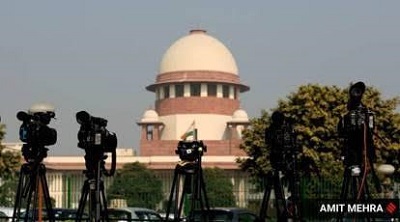Introduction
In contemporary times, the role of judicial review has never been more critical. The Supreme Court of India faces pressing questions regarding the constitutionality of laws like the Citizenship (Amendment) Act (CAA) and its accompanying rules. Concerns have arisen from the ambiguity of these rules, particularly about the fate of applicants whose requests for citizenship are denied, leading to fears of potential detention. Additionally, worries about dual citizenship for foreign applicants without renouncing their original citizenship have been raised, suggesting a contradiction to the parent Act's spirit.
The Necessity for Judicial Interference
Interdicting statutes is not a routine exercise for constitutional courts. Generally, laws made by Parliament are presumed valid unless they evidently breach constitutional provisions. This principle, as seen in Manish Kumar vs Union of India (2021), assumes that legislative processes are free from malice. The Supreme Court has echoed this sentiment, asserting that "legislative malice is beyond the pale of jurisdiction of the law courts" in cases like Gurudevdatta Vksss Maryadit and Ors. vs State Of Maharashtra and Ors (2001).
However, this conventional wisdom falls short in addressing contemporary challenges posed by populist regimes, which often enact motivated or targeted legislation. Such regimes may also manipulate electoral systems through legislative means. This modern trend demands a more advanced and assertive judicial approach. Adhering to outdated presumptions about the validity of laws without scrutinizing their intentions can undermine the counter-majoritarian role that constitutional courts should play during critical times.
The Political Nature of Legislation
Legislation is inherently a political statement. Regimes that disregard constitutional democracy tend to enact laws that conflict with constitutional principles. On such occasions, judicial euphoria about the validity of laws has sometimes prevented the Supreme Court from intervening. The lack of a stay order during demonetization, as observed in Vivek Narayan Sharma vs Union of India (2023), allowed irreversible consequences. Similarly, the non-interdiction of the dilution of Kashmir's special status, as seen in In Re Article 370 of the Constitution of India (2023), rendered litigation almost moot.
In contrast, Anoop Baranwal vs Union of India (2023) was a radical judgment by the Supreme Court, advocating for an independent body to select the Election Commission of India (ECI) without executive dominance. Yet, the Centre's Chief Election Commissioner and other Election Commissioners (Appointment, Conditions of Service and Term of Office) Act, 2023, reverted to the previous system where the Prime Minister's Committee made the selections. This Act, which was challenged in Jaya Thakur vs Union of India (2024), was allowed to operate based on presumed validity, despite appearing unconstitutional and threatening the democratic foundation of free and fair elections.
Targeted Legislation and Its Implications
The CAA and its rules are clear examples of targeted legislation, where legislative malice is apparent. The law discriminates by excluding Muslims from the citizenship process based on religion. Similarly, the Muslim Women (Protection of Rights on Marriage) Act (2019) criminalized instant triple talaq, despite the Supreme Court invalidating it in Shayara Bano (2017). This statute, aimed at the Muslim community, often failed to protect Muslim women and instead promoted divisive agendas. Anti-conversion laws in certain states further exemplify targeted legislation.
In the United States, conventional views also resisted judicial nullification of statutes based on malice. Legal scholar John Hart Ely argued against using the Constitution to punish the perceived evil intentions of political branches. However, motivated legislations reflecting discriminatory intent call for rigorous judicial scrutiny. As Susannah W. Pollvogt noted, "animus can never constitute a legitimate state interest for purposes of equal protection analysis." The U.S. Supreme Court's decision in United States Dept. of Agriculture vs Moreno (1973), which struck down a law excluding "hippies" from collective residential rights, demonstrated that such exclusion implied a discriminatory intent.
Indian Judicial Precedents
The Indian Supreme Court has, in certain instances, effectively interdicted the operation of parliamentary legislation. In Ashoka Kumar Thakur vs Union of India (2007), regarding the 27% quota for Other Backward Community (OBC) candidates in professional colleges, the Court issued an injunction. Similarly, in Rakesh Vaishnav vs Union of India (2021), the Court stayed the implementation of the contentious farm laws, which the Centre eventually withdrew following widespread protests by farmers.
For statutes that are blatantly unconstitutional or divisive, judicial review should be robust, immediate, and clear. The Supreme Court must learn from its past actions and comprehend the political consequences of its insensitivity during critical periods. Delays often defeat the purpose of constitutional adjudication, making timely judicial review essential when addressing malicious and unconstitutional laws.
Conclusion
In conclusion, the judiciary must adapt to contemporary challenges and adopt a more assertive approach in reviewing legislation. The presumption of validity should not shield laws that are evidently motivated or targeted from rigorous scrutiny. By doing so, the Supreme Court can fulfill its role in safeguarding constitutional democracy, ensuring that laws reflect the principles enshrined in the Constitution rather than the whims of populist regimes. In times of critical need, strong judicial adjudication is imperative to protect the rights and freedoms of all citizens, maintaining the integrity of the democratic process.
|
Probable Questions for UPSC Mains Exam
|
Source – The Hindu







